Impact of Nursing Leadership on Professional Practice and Resilience
VerifiedAdded on 2022/10/04
|9
|3017
|18
Essay
AI Summary
This essay delves into the multifaceted responsibilities of graduate nurses within healthcare settings, emphasizing the critical role of nursing leadership. It examines a case study focusing on a Nurse Unit Manager's (NUM) impact on professional practice, exploring ethical, legal, and scope-of-practice boundaries. The essay analyzes the application of the Gibbs reflective model for developing personal and professional resilience, offering strategies to navigate challenges. It also discusses supportive elements in effective leadership, such as knowledge, evidence, communication, and networks. The paper concludes with an action plan for graduate nurses to enhance their confidence and emotional well-being, highlighting the NUM's role in fostering a positive and safe environment. This comprehensive analysis provides valuable insights into the dynamics of nursing leadership and its influence on patient care and professional growth.
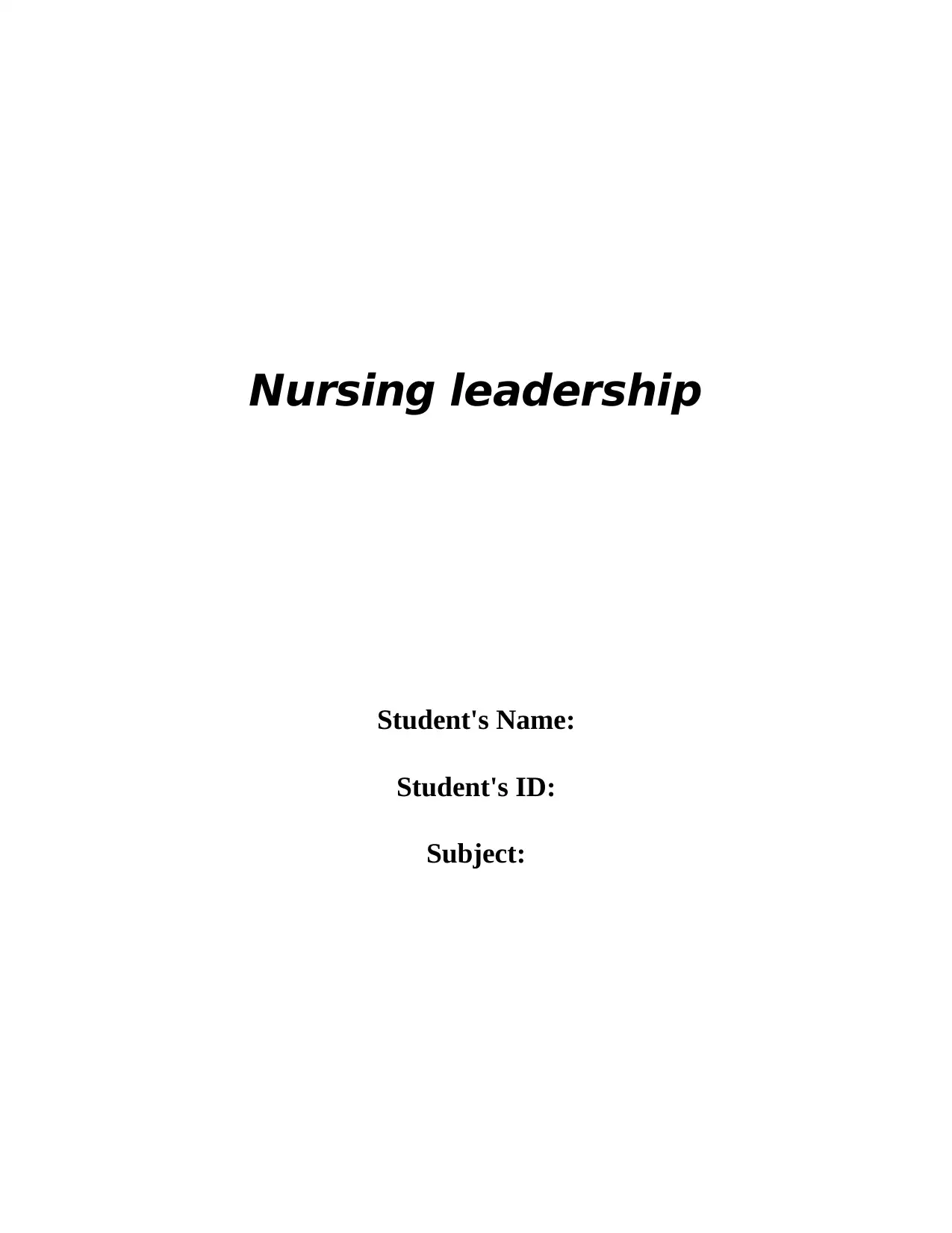
Nursing leadership
Student's Name:
Student's ID:
Subject:
Student's Name:
Student's ID:
Subject:
Paraphrase This Document
Need a fresh take? Get an instant paraphrase of this document with our AI Paraphraser
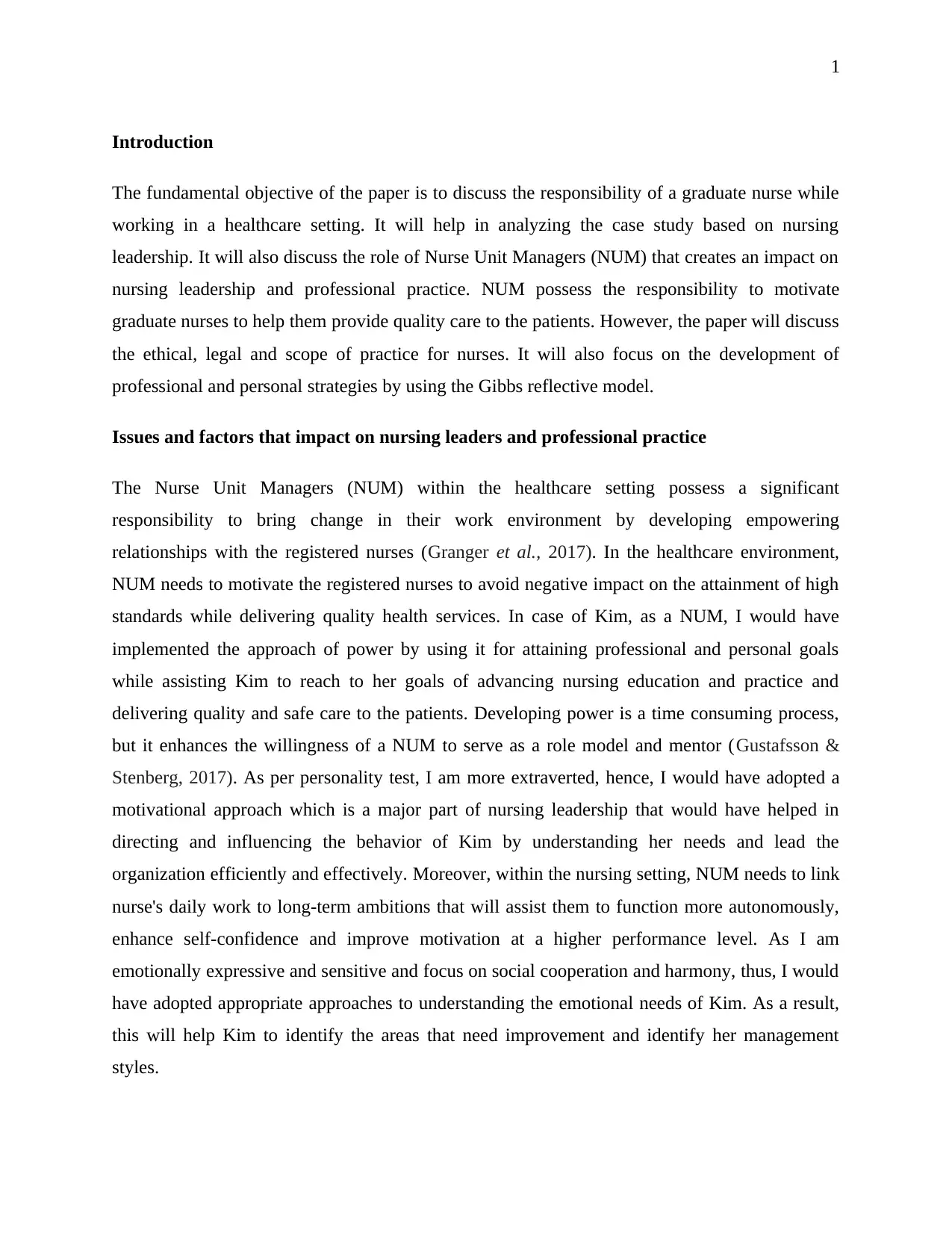
1
Introduction
The fundamental objective of the paper is to discuss the responsibility of a graduate nurse while
working in a healthcare setting. It will help in analyzing the case study based on nursing
leadership. It will also discuss the role of Nurse Unit Managers (NUM) that creates an impact on
nursing leadership and professional practice. NUM possess the responsibility to motivate
graduate nurses to help them provide quality care to the patients. However, the paper will discuss
the ethical, legal and scope of practice for nurses. It will also focus on the development of
professional and personal strategies by using the Gibbs reflective model.
Issues and factors that impact on nursing leaders and professional practice
The Nurse Unit Managers (NUM) within the healthcare setting possess a significant
responsibility to bring change in their work environment by developing empowering
relationships with the registered nurses (Granger et al., 2017). In the healthcare environment,
NUM needs to motivate the registered nurses to avoid negative impact on the attainment of high
standards while delivering quality health services. In case of Kim, as a NUM, I would have
implemented the approach of power by using it for attaining professional and personal goals
while assisting Kim to reach to her goals of advancing nursing education and practice and
delivering quality and safe care to the patients. Developing power is a time consuming process,
but it enhances the willingness of a NUM to serve as a role model and mentor (Gustafsson &
Stenberg, 2017). As per personality test, I am more extraverted, hence, I would have adopted a
motivational approach which is a major part of nursing leadership that would have helped in
directing and influencing the behavior of Kim by understanding her needs and lead the
organization efficiently and effectively. Moreover, within the nursing setting, NUM needs to link
nurse's daily work to long-term ambitions that will assist them to function more autonomously,
enhance self-confidence and improve motivation at a higher performance level. As I am
emotionally expressive and sensitive and focus on social cooperation and harmony, thus, I would
have adopted appropriate approaches to understanding the emotional needs of Kim. As a result,
this will help Kim to identify the areas that need improvement and identify her management
styles.
Introduction
The fundamental objective of the paper is to discuss the responsibility of a graduate nurse while
working in a healthcare setting. It will help in analyzing the case study based on nursing
leadership. It will also discuss the role of Nurse Unit Managers (NUM) that creates an impact on
nursing leadership and professional practice. NUM possess the responsibility to motivate
graduate nurses to help them provide quality care to the patients. However, the paper will discuss
the ethical, legal and scope of practice for nurses. It will also focus on the development of
professional and personal strategies by using the Gibbs reflective model.
Issues and factors that impact on nursing leaders and professional practice
The Nurse Unit Managers (NUM) within the healthcare setting possess a significant
responsibility to bring change in their work environment by developing empowering
relationships with the registered nurses (Granger et al., 2017). In the healthcare environment,
NUM needs to motivate the registered nurses to avoid negative impact on the attainment of high
standards while delivering quality health services. In case of Kim, as a NUM, I would have
implemented the approach of power by using it for attaining professional and personal goals
while assisting Kim to reach to her goals of advancing nursing education and practice and
delivering quality and safe care to the patients. Developing power is a time consuming process,
but it enhances the willingness of a NUM to serve as a role model and mentor (Gustafsson &
Stenberg, 2017). As per personality test, I am more extraverted, hence, I would have adopted a
motivational approach which is a major part of nursing leadership that would have helped in
directing and influencing the behavior of Kim by understanding her needs and lead the
organization efficiently and effectively. Moreover, within the nursing setting, NUM needs to link
nurse's daily work to long-term ambitions that will assist them to function more autonomously,
enhance self-confidence and improve motivation at a higher performance level. As I am
emotionally expressive and sensitive and focus on social cooperation and harmony, thus, I would
have adopted appropriate approaches to understanding the emotional needs of Kim. As a result,
this will help Kim to identify the areas that need improvement and identify her management
styles.
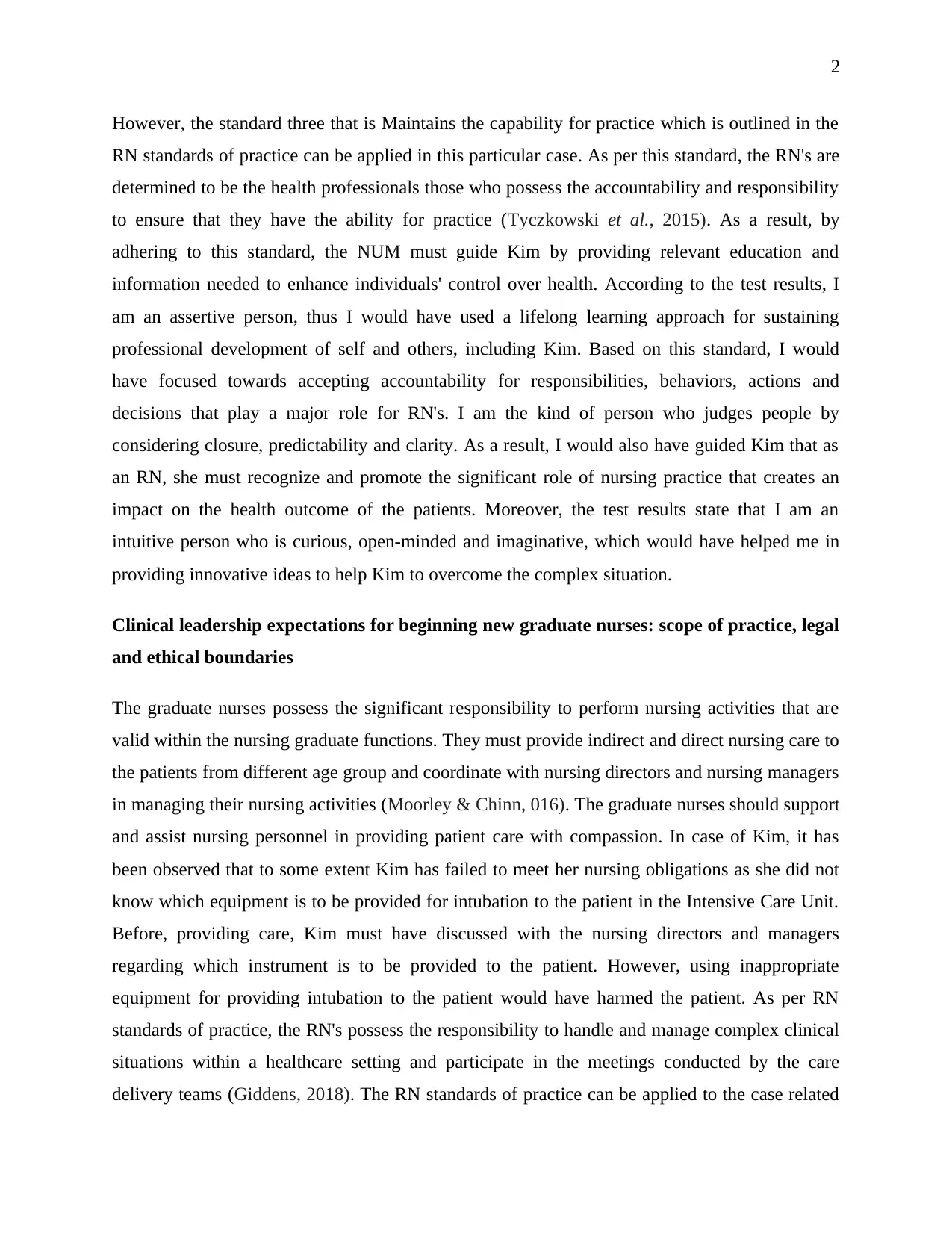
2
However, the standard three that is Maintains the capability for practice which is outlined in the
RN standards of practice can be applied in this particular case. As per this standard, the RN's are
determined to be the health professionals those who possess the accountability and responsibility
to ensure that they have the ability for practice (Tyczkowski et al., 2015). As a result, by
adhering to this standard, the NUM must guide Kim by providing relevant education and
information needed to enhance individuals' control over health. According to the test results, I
am an assertive person, thus I would have used a lifelong learning approach for sustaining
professional development of self and others, including Kim. Based on this standard, I would
have focused towards accepting accountability for responsibilities, behaviors, actions and
decisions that play a major role for RN's. I am the kind of person who judges people by
considering closure, predictability and clarity. As a result, I would also have guided Kim that as
an RN, she must recognize and promote the significant role of nursing practice that creates an
impact on the health outcome of the patients. Moreover, the test results state that I am an
intuitive person who is curious, open-minded and imaginative, which would have helped me in
providing innovative ideas to help Kim to overcome the complex situation.
Clinical leadership expectations for beginning new graduate nurses: scope of practice, legal
and ethical boundaries
The graduate nurses possess the significant responsibility to perform nursing activities that are
valid within the nursing graduate functions. They must provide indirect and direct nursing care to
the patients from different age group and coordinate with nursing directors and nursing managers
in managing their nursing activities (Moorley & Chinn, 016). The graduate nurses should support
and assist nursing personnel in providing patient care with compassion. In case of Kim, it has
been observed that to some extent Kim has failed to meet her nursing obligations as she did not
know which equipment is to be provided for intubation to the patient in the Intensive Care Unit.
Before, providing care, Kim must have discussed with the nursing directors and managers
regarding which instrument is to be provided to the patient. However, using inappropriate
equipment for providing intubation to the patient would have harmed the patient. As per RN
standards of practice, the RN's possess the responsibility to handle and manage complex clinical
situations within a healthcare setting and participate in the meetings conducted by the care
delivery teams (Giddens, 2018). The RN standards of practice can be applied to the case related
However, the standard three that is Maintains the capability for practice which is outlined in the
RN standards of practice can be applied in this particular case. As per this standard, the RN's are
determined to be the health professionals those who possess the accountability and responsibility
to ensure that they have the ability for practice (Tyczkowski et al., 2015). As a result, by
adhering to this standard, the NUM must guide Kim by providing relevant education and
information needed to enhance individuals' control over health. According to the test results, I
am an assertive person, thus I would have used a lifelong learning approach for sustaining
professional development of self and others, including Kim. Based on this standard, I would
have focused towards accepting accountability for responsibilities, behaviors, actions and
decisions that play a major role for RN's. I am the kind of person who judges people by
considering closure, predictability and clarity. As a result, I would also have guided Kim that as
an RN, she must recognize and promote the significant role of nursing practice that creates an
impact on the health outcome of the patients. Moreover, the test results state that I am an
intuitive person who is curious, open-minded and imaginative, which would have helped me in
providing innovative ideas to help Kim to overcome the complex situation.
Clinical leadership expectations for beginning new graduate nurses: scope of practice, legal
and ethical boundaries
The graduate nurses possess the significant responsibility to perform nursing activities that are
valid within the nursing graduate functions. They must provide indirect and direct nursing care to
the patients from different age group and coordinate with nursing directors and nursing managers
in managing their nursing activities (Moorley & Chinn, 016). The graduate nurses should support
and assist nursing personnel in providing patient care with compassion. In case of Kim, it has
been observed that to some extent Kim has failed to meet her nursing obligations as she did not
know which equipment is to be provided for intubation to the patient in the Intensive Care Unit.
Before, providing care, Kim must have discussed with the nursing directors and managers
regarding which instrument is to be provided to the patient. However, using inappropriate
equipment for providing intubation to the patient would have harmed the patient. As per RN
standards of practice, the RN's possess the responsibility to handle and manage complex clinical
situations within a healthcare setting and participate in the meetings conducted by the care
delivery teams (Giddens, 2018). The RN standards of practice can be applied to the case related
⊘ This is a preview!⊘
Do you want full access?
Subscribe today to unlock all pages.

Trusted by 1+ million students worldwide
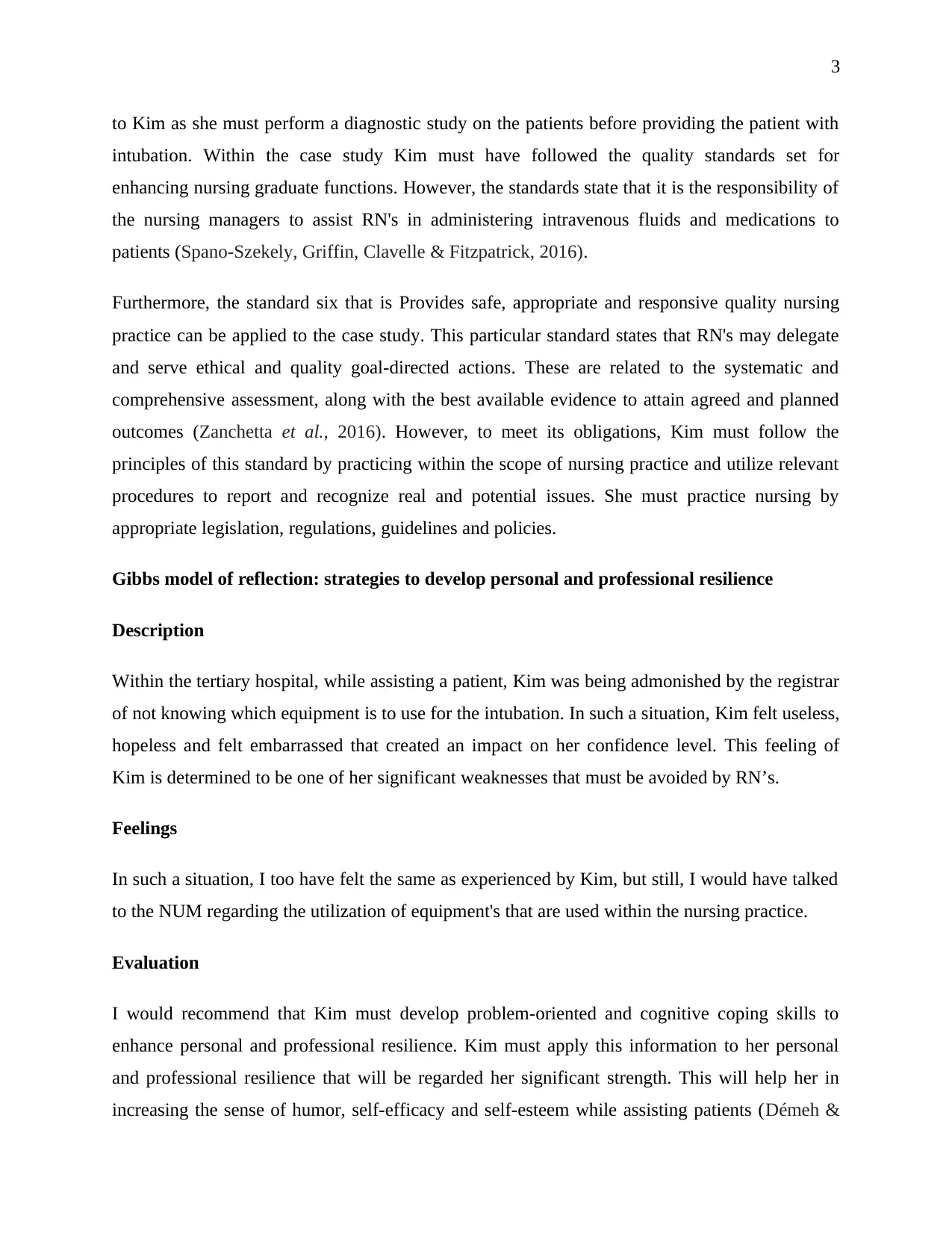
3
to Kim as she must perform a diagnostic study on the patients before providing the patient with
intubation. Within the case study Kim must have followed the quality standards set for
enhancing nursing graduate functions. However, the standards state that it is the responsibility of
the nursing managers to assist RN's in administering intravenous fluids and medications to
patients (Spano-Szekely, Griffin, Clavelle & Fitzpatrick, 2016).
Furthermore, the standard six that is Provides safe, appropriate and responsive quality nursing
practice can be applied to the case study. This particular standard states that RN's may delegate
and serve ethical and quality goal-directed actions. These are related to the systematic and
comprehensive assessment, along with the best available evidence to attain agreed and planned
outcomes (Zanchetta et al., 2016). However, to meet its obligations, Kim must follow the
principles of this standard by practicing within the scope of nursing practice and utilize relevant
procedures to report and recognize real and potential issues. She must practice nursing by
appropriate legislation, regulations, guidelines and policies.
Gibbs model of reflection: strategies to develop personal and professional resilience
Description
Within the tertiary hospital, while assisting a patient, Kim was being admonished by the registrar
of not knowing which equipment is to use for the intubation. In such a situation, Kim felt useless,
hopeless and felt embarrassed that created an impact on her confidence level. This feeling of
Kim is determined to be one of her significant weaknesses that must be avoided by RN’s.
Feelings
In such a situation, I too have felt the same as experienced by Kim, but still, I would have talked
to the NUM regarding the utilization of equipment's that are used within the nursing practice.
Evaluation
I would recommend that Kim must develop problem-oriented and cognitive coping skills to
enhance personal and professional resilience. Kim must apply this information to her personal
and professional resilience that will be regarded her significant strength. This will help her in
increasing the sense of humor, self-efficacy and self-esteem while assisting patients (Démeh &
to Kim as she must perform a diagnostic study on the patients before providing the patient with
intubation. Within the case study Kim must have followed the quality standards set for
enhancing nursing graduate functions. However, the standards state that it is the responsibility of
the nursing managers to assist RN's in administering intravenous fluids and medications to
patients (Spano-Szekely, Griffin, Clavelle & Fitzpatrick, 2016).
Furthermore, the standard six that is Provides safe, appropriate and responsive quality nursing
practice can be applied to the case study. This particular standard states that RN's may delegate
and serve ethical and quality goal-directed actions. These are related to the systematic and
comprehensive assessment, along with the best available evidence to attain agreed and planned
outcomes (Zanchetta et al., 2016). However, to meet its obligations, Kim must follow the
principles of this standard by practicing within the scope of nursing practice and utilize relevant
procedures to report and recognize real and potential issues. She must practice nursing by
appropriate legislation, regulations, guidelines and policies.
Gibbs model of reflection: strategies to develop personal and professional resilience
Description
Within the tertiary hospital, while assisting a patient, Kim was being admonished by the registrar
of not knowing which equipment is to use for the intubation. In such a situation, Kim felt useless,
hopeless and felt embarrassed that created an impact on her confidence level. This feeling of
Kim is determined to be one of her significant weaknesses that must be avoided by RN’s.
Feelings
In such a situation, I too have felt the same as experienced by Kim, but still, I would have talked
to the NUM regarding the utilization of equipment's that are used within the nursing practice.
Evaluation
I would recommend that Kim must develop problem-oriented and cognitive coping skills to
enhance personal and professional resilience. Kim must apply this information to her personal
and professional resilience that will be regarded her significant strength. This will help her in
increasing the sense of humor, self-efficacy and self-esteem while assisting patients (Démeh &
Paraphrase This Document
Need a fresh take? Get an instant paraphrase of this document with our AI Paraphraser
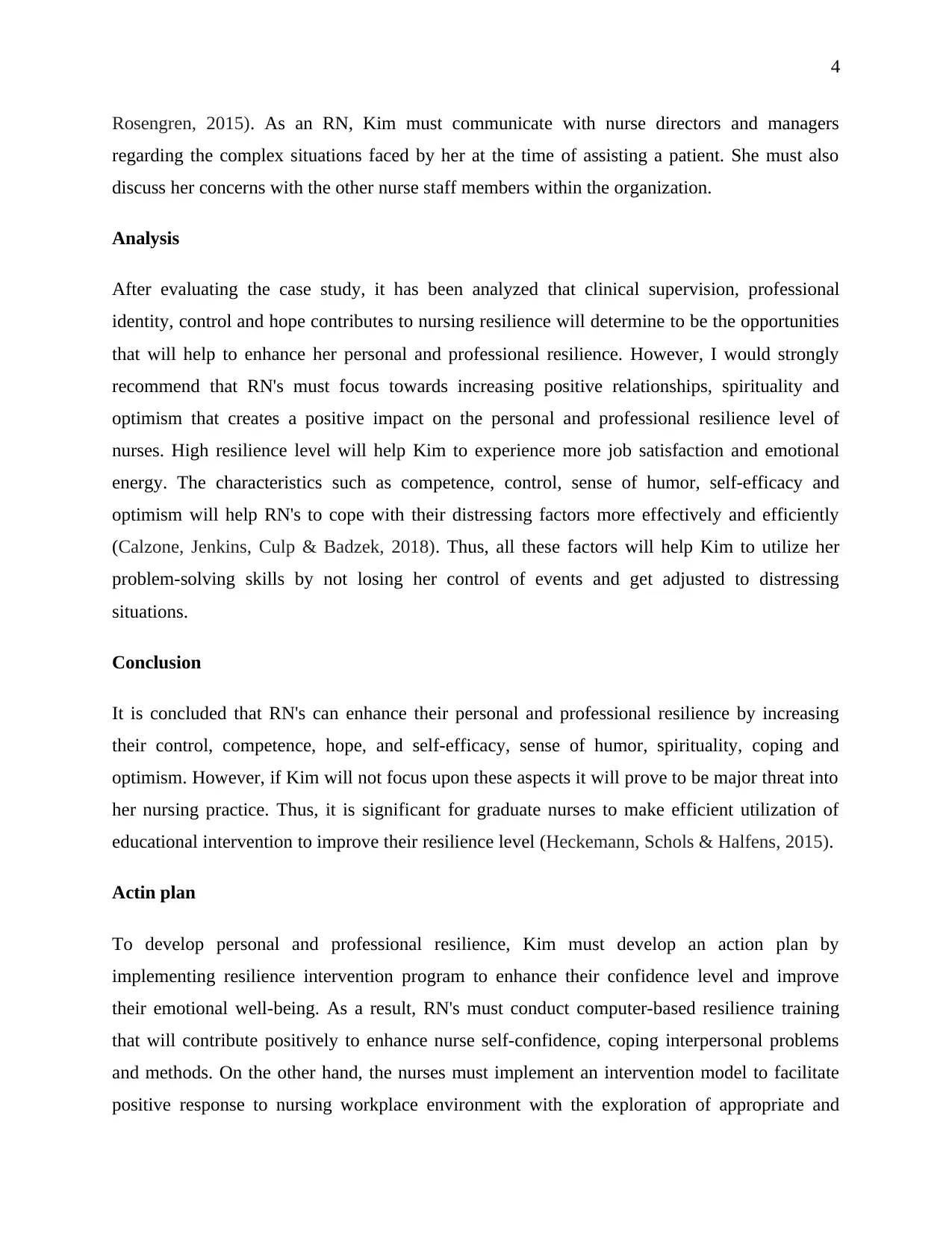
4
Rosengren, 2015). As an RN, Kim must communicate with nurse directors and managers
regarding the complex situations faced by her at the time of assisting a patient. She must also
discuss her concerns with the other nurse staff members within the organization.
Analysis
After evaluating the case study, it has been analyzed that clinical supervision, professional
identity, control and hope contributes to nursing resilience will determine to be the opportunities
that will help to enhance her personal and professional resilience. However, I would strongly
recommend that RN's must focus towards increasing positive relationships, spirituality and
optimism that creates a positive impact on the personal and professional resilience level of
nurses. High resilience level will help Kim to experience more job satisfaction and emotional
energy. The characteristics such as competence, control, sense of humor, self-efficacy and
optimism will help RN's to cope with their distressing factors more effectively and efficiently
(Calzone, Jenkins, Culp & Badzek, 2018). Thus, all these factors will help Kim to utilize her
problem-solving skills by not losing her control of events and get adjusted to distressing
situations.
Conclusion
It is concluded that RN's can enhance their personal and professional resilience by increasing
their control, competence, hope, and self-efficacy, sense of humor, spirituality, coping and
optimism. However, if Kim will not focus upon these aspects it will prove to be major threat into
her nursing practice. Thus, it is significant for graduate nurses to make efficient utilization of
educational intervention to improve their resilience level (Heckemann, Schols & Halfens, 2015).
Actin plan
To develop personal and professional resilience, Kim must develop an action plan by
implementing resilience intervention program to enhance their confidence level and improve
their emotional well-being. As a result, RN's must conduct computer-based resilience training
that will contribute positively to enhance nurse self-confidence, coping interpersonal problems
and methods. On the other hand, the nurses must implement an intervention model to facilitate
positive response to nursing workplace environment with the exploration of appropriate and
Rosengren, 2015). As an RN, Kim must communicate with nurse directors and managers
regarding the complex situations faced by her at the time of assisting a patient. She must also
discuss her concerns with the other nurse staff members within the organization.
Analysis
After evaluating the case study, it has been analyzed that clinical supervision, professional
identity, control and hope contributes to nursing resilience will determine to be the opportunities
that will help to enhance her personal and professional resilience. However, I would strongly
recommend that RN's must focus towards increasing positive relationships, spirituality and
optimism that creates a positive impact on the personal and professional resilience level of
nurses. High resilience level will help Kim to experience more job satisfaction and emotional
energy. The characteristics such as competence, control, sense of humor, self-efficacy and
optimism will help RN's to cope with their distressing factors more effectively and efficiently
(Calzone, Jenkins, Culp & Badzek, 2018). Thus, all these factors will help Kim to utilize her
problem-solving skills by not losing her control of events and get adjusted to distressing
situations.
Conclusion
It is concluded that RN's can enhance their personal and professional resilience by increasing
their control, competence, hope, and self-efficacy, sense of humor, spirituality, coping and
optimism. However, if Kim will not focus upon these aspects it will prove to be major threat into
her nursing practice. Thus, it is significant for graduate nurses to make efficient utilization of
educational intervention to improve their resilience level (Heckemann, Schols & Halfens, 2015).
Actin plan
To develop personal and professional resilience, Kim must develop an action plan by
implementing resilience intervention program to enhance their confidence level and improve
their emotional well-being. As a result, RN's must conduct computer-based resilience training
that will contribute positively to enhance nurse self-confidence, coping interpersonal problems
and methods. On the other hand, the nurses must implement an intervention model to facilitate
positive response to nursing workplace environment with the exploration of appropriate and
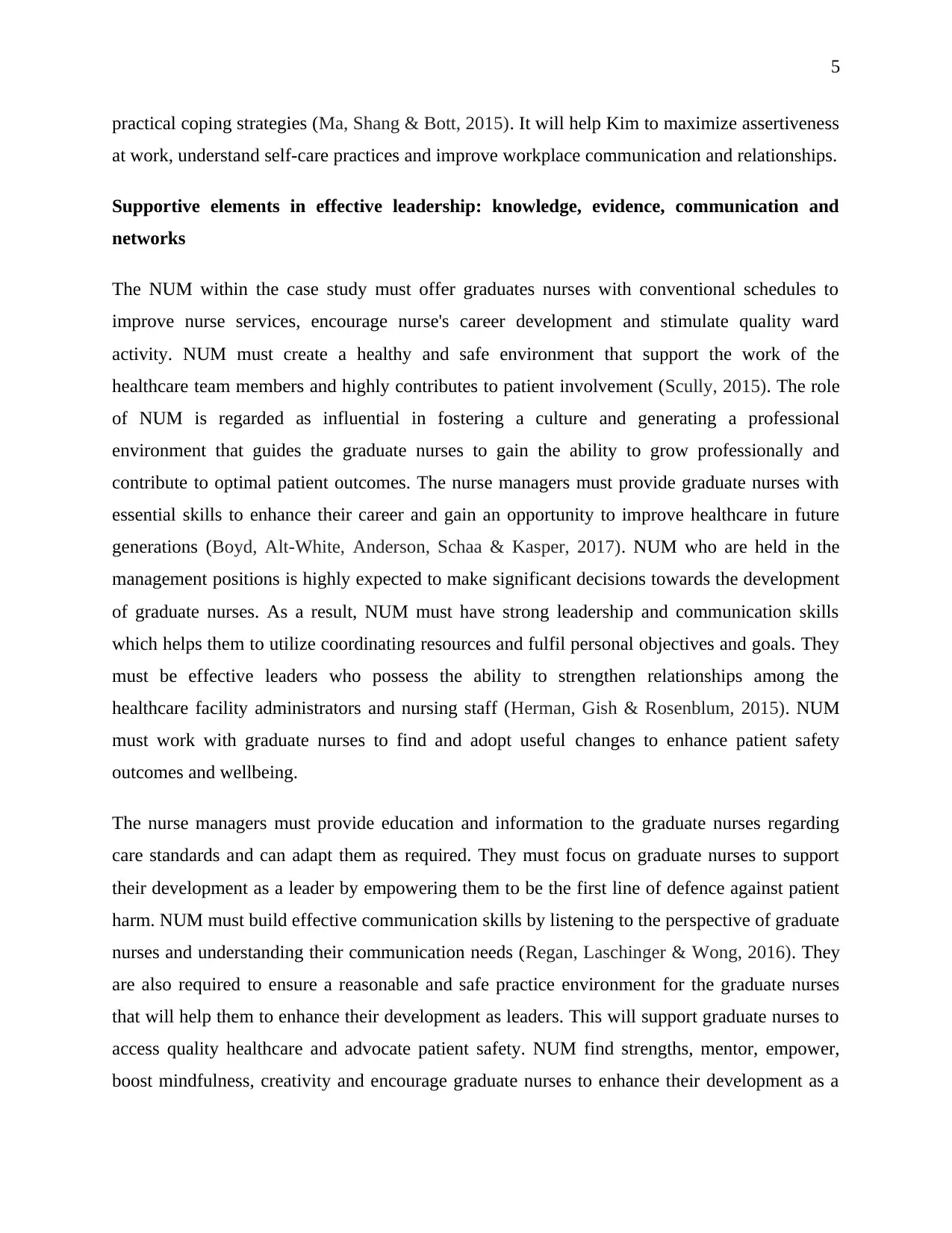
5
practical coping strategies (Ma, Shang & Bott, 2015). It will help Kim to maximize assertiveness
at work, understand self-care practices and improve workplace communication and relationships.
Supportive elements in effective leadership: knowledge, evidence, communication and
networks
The NUM within the case study must offer graduates nurses with conventional schedules to
improve nurse services, encourage nurse's career development and stimulate quality ward
activity. NUM must create a healthy and safe environment that support the work of the
healthcare team members and highly contributes to patient involvement (Scully, 2015). The role
of NUM is regarded as influential in fostering a culture and generating a professional
environment that guides the graduate nurses to gain the ability to grow professionally and
contribute to optimal patient outcomes. The nurse managers must provide graduate nurses with
essential skills to enhance their career and gain an opportunity to improve healthcare in future
generations (Boyd, Alt-White, Anderson, Schaa & Kasper, 2017). NUM who are held in the
management positions is highly expected to make significant decisions towards the development
of graduate nurses. As a result, NUM must have strong leadership and communication skills
which helps them to utilize coordinating resources and fulfil personal objectives and goals. They
must be effective leaders who possess the ability to strengthen relationships among the
healthcare facility administrators and nursing staff (Herman, Gish & Rosenblum, 2015). NUM
must work with graduate nurses to find and adopt useful changes to enhance patient safety
outcomes and wellbeing.
The nurse managers must provide education and information to the graduate nurses regarding
care standards and can adapt them as required. They must focus on graduate nurses to support
their development as a leader by empowering them to be the first line of defence against patient
harm. NUM must build effective communication skills by listening to the perspective of graduate
nurses and understanding their communication needs (Regan, Laschinger & Wong, 2016). They
are also required to ensure a reasonable and safe practice environment for the graduate nurses
that will help them to enhance their development as leaders. This will support graduate nurses to
access quality healthcare and advocate patient safety. NUM find strengths, mentor, empower,
boost mindfulness, creativity and encourage graduate nurses to enhance their development as a
practical coping strategies (Ma, Shang & Bott, 2015). It will help Kim to maximize assertiveness
at work, understand self-care practices and improve workplace communication and relationships.
Supportive elements in effective leadership: knowledge, evidence, communication and
networks
The NUM within the case study must offer graduates nurses with conventional schedules to
improve nurse services, encourage nurse's career development and stimulate quality ward
activity. NUM must create a healthy and safe environment that support the work of the
healthcare team members and highly contributes to patient involvement (Scully, 2015). The role
of NUM is regarded as influential in fostering a culture and generating a professional
environment that guides the graduate nurses to gain the ability to grow professionally and
contribute to optimal patient outcomes. The nurse managers must provide graduate nurses with
essential skills to enhance their career and gain an opportunity to improve healthcare in future
generations (Boyd, Alt-White, Anderson, Schaa & Kasper, 2017). NUM who are held in the
management positions is highly expected to make significant decisions towards the development
of graduate nurses. As a result, NUM must have strong leadership and communication skills
which helps them to utilize coordinating resources and fulfil personal objectives and goals. They
must be effective leaders who possess the ability to strengthen relationships among the
healthcare facility administrators and nursing staff (Herman, Gish & Rosenblum, 2015). NUM
must work with graduate nurses to find and adopt useful changes to enhance patient safety
outcomes and wellbeing.
The nurse managers must provide education and information to the graduate nurses regarding
care standards and can adapt them as required. They must focus on graduate nurses to support
their development as a leader by empowering them to be the first line of defence against patient
harm. NUM must build effective communication skills by listening to the perspective of graduate
nurses and understanding their communication needs (Regan, Laschinger & Wong, 2016). They
are also required to ensure a reasonable and safe practice environment for the graduate nurses
that will help them to enhance their development as leaders. This will support graduate nurses to
access quality healthcare and advocate patient safety. NUM find strengths, mentor, empower,
boost mindfulness, creativity and encourage graduate nurses to enhance their development as a
⊘ This is a preview!⊘
Do you want full access?
Subscribe today to unlock all pages.

Trusted by 1+ million students worldwide
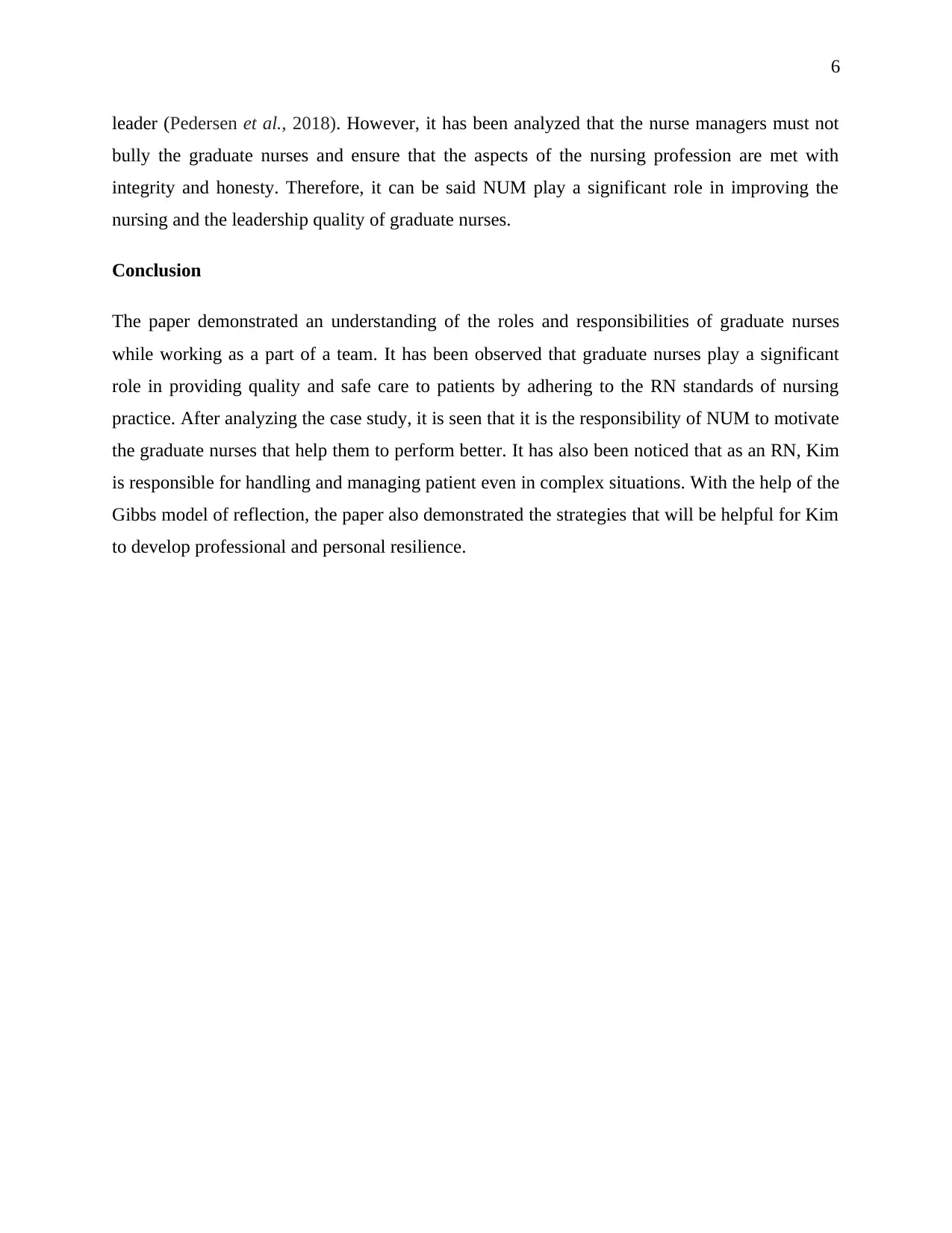
6
leader (Pedersen et al., 2018). However, it has been analyzed that the nurse managers must not
bully the graduate nurses and ensure that the aspects of the nursing profession are met with
integrity and honesty. Therefore, it can be said NUM play a significant role in improving the
nursing and the leadership quality of graduate nurses.
Conclusion
The paper demonstrated an understanding of the roles and responsibilities of graduate nurses
while working as a part of a team. It has been observed that graduate nurses play a significant
role in providing quality and safe care to patients by adhering to the RN standards of nursing
practice. After analyzing the case study, it is seen that it is the responsibility of NUM to motivate
the graduate nurses that help them to perform better. It has also been noticed that as an RN, Kim
is responsible for handling and managing patient even in complex situations. With the help of the
Gibbs model of reflection, the paper also demonstrated the strategies that will be helpful for Kim
to develop professional and personal resilience.
leader (Pedersen et al., 2018). However, it has been analyzed that the nurse managers must not
bully the graduate nurses and ensure that the aspects of the nursing profession are met with
integrity and honesty. Therefore, it can be said NUM play a significant role in improving the
nursing and the leadership quality of graduate nurses.
Conclusion
The paper demonstrated an understanding of the roles and responsibilities of graduate nurses
while working as a part of a team. It has been observed that graduate nurses play a significant
role in providing quality and safe care to patients by adhering to the RN standards of nursing
practice. After analyzing the case study, it is seen that it is the responsibility of NUM to motivate
the graduate nurses that help them to perform better. It has also been noticed that as an RN, Kim
is responsible for handling and managing patient even in complex situations. With the help of the
Gibbs model of reflection, the paper also demonstrated the strategies that will be helpful for Kim
to develop professional and personal resilience.
Paraphrase This Document
Need a fresh take? Get an instant paraphrase of this document with our AI Paraphraser
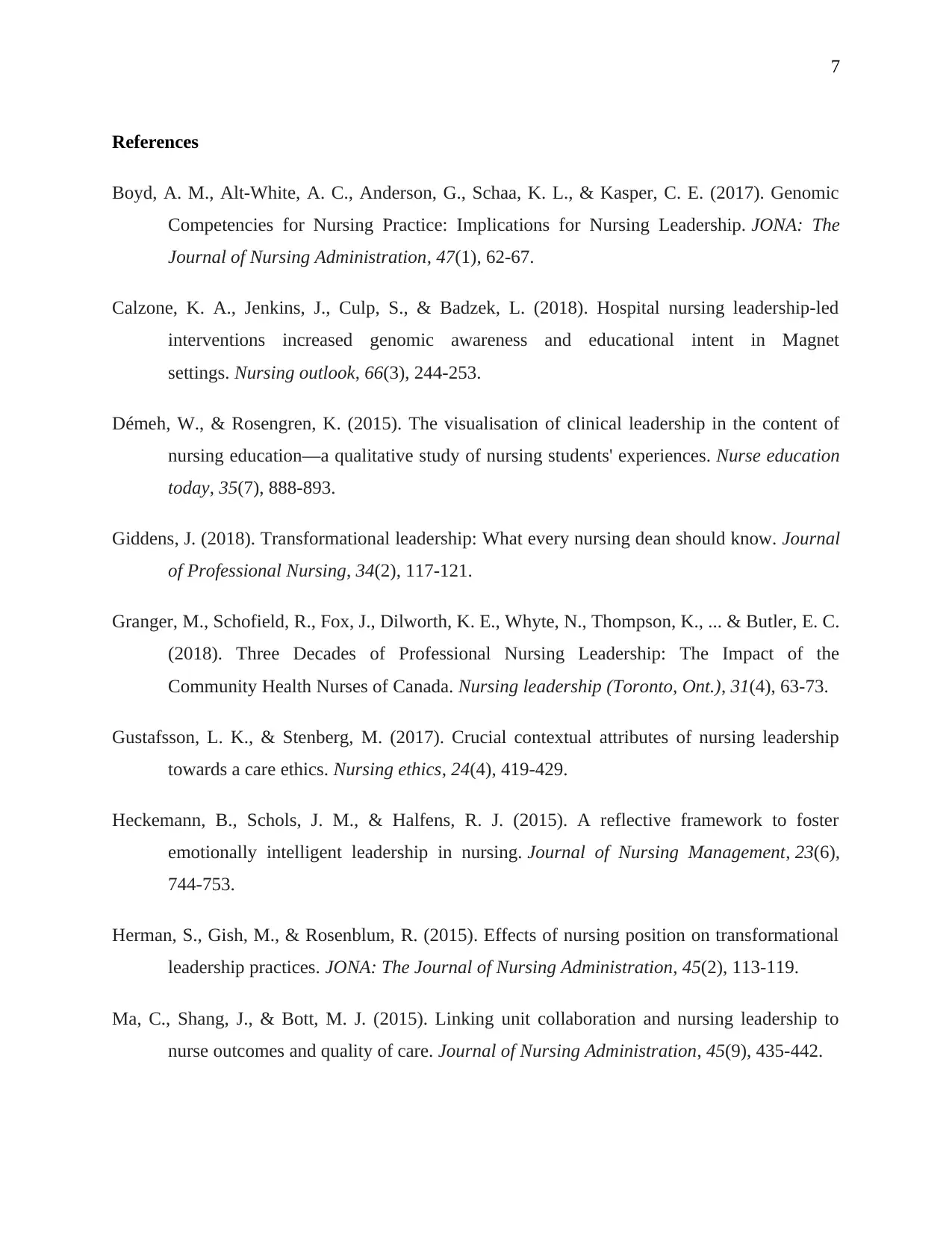
7
References
Boyd, A. M., Alt-White, A. C., Anderson, G., Schaa, K. L., & Kasper, C. E. (2017). Genomic
Competencies for Nursing Practice: Implications for Nursing Leadership. JONA: The
Journal of Nursing Administration, 47(1), 62-67.
Calzone, K. A., Jenkins, J., Culp, S., & Badzek, L. (2018). Hospital nursing leadership-led
interventions increased genomic awareness and educational intent in Magnet
settings. Nursing outlook, 66(3), 244-253.
Démeh, W., & Rosengren, K. (2015). The visualisation of clinical leadership in the content of
nursing education—a qualitative study of nursing students' experiences. Nurse education
today, 35(7), 888-893.
Giddens, J. (2018). Transformational leadership: What every nursing dean should know. Journal
of Professional Nursing, 34(2), 117-121.
Granger, M., Schofield, R., Fox, J., Dilworth, K. E., Whyte, N., Thompson, K., ... & Butler, E. C.
(2018). Three Decades of Professional Nursing Leadership: The Impact of the
Community Health Nurses of Canada. Nursing leadership (Toronto, Ont.), 31(4), 63-73.
Gustafsson, L. K., & Stenberg, M. (2017). Crucial contextual attributes of nursing leadership
towards a care ethics. Nursing ethics, 24(4), 419-429.
Heckemann, B., Schols, J. M., & Halfens, R. J. (2015). A reflective framework to foster
emotionally intelligent leadership in nursing. Journal of Nursing Management, 23(6),
744-753.
Herman, S., Gish, M., & Rosenblum, R. (2015). Effects of nursing position on transformational
leadership practices. JONA: The Journal of Nursing Administration, 45(2), 113-119.
Ma, C., Shang, J., & Bott, M. J. (2015). Linking unit collaboration and nursing leadership to
nurse outcomes and quality of care. Journal of Nursing Administration, 45(9), 435-442.
References
Boyd, A. M., Alt-White, A. C., Anderson, G., Schaa, K. L., & Kasper, C. E. (2017). Genomic
Competencies for Nursing Practice: Implications for Nursing Leadership. JONA: The
Journal of Nursing Administration, 47(1), 62-67.
Calzone, K. A., Jenkins, J., Culp, S., & Badzek, L. (2018). Hospital nursing leadership-led
interventions increased genomic awareness and educational intent in Magnet
settings. Nursing outlook, 66(3), 244-253.
Démeh, W., & Rosengren, K. (2015). The visualisation of clinical leadership in the content of
nursing education—a qualitative study of nursing students' experiences. Nurse education
today, 35(7), 888-893.
Giddens, J. (2018). Transformational leadership: What every nursing dean should know. Journal
of Professional Nursing, 34(2), 117-121.
Granger, M., Schofield, R., Fox, J., Dilworth, K. E., Whyte, N., Thompson, K., ... & Butler, E. C.
(2018). Three Decades of Professional Nursing Leadership: The Impact of the
Community Health Nurses of Canada. Nursing leadership (Toronto, Ont.), 31(4), 63-73.
Gustafsson, L. K., & Stenberg, M. (2017). Crucial contextual attributes of nursing leadership
towards a care ethics. Nursing ethics, 24(4), 419-429.
Heckemann, B., Schols, J. M., & Halfens, R. J. (2015). A reflective framework to foster
emotionally intelligent leadership in nursing. Journal of Nursing Management, 23(6),
744-753.
Herman, S., Gish, M., & Rosenblum, R. (2015). Effects of nursing position on transformational
leadership practices. JONA: The Journal of Nursing Administration, 45(2), 113-119.
Ma, C., Shang, J., & Bott, M. J. (2015). Linking unit collaboration and nursing leadership to
nurse outcomes and quality of care. Journal of Nursing Administration, 45(9), 435-442.
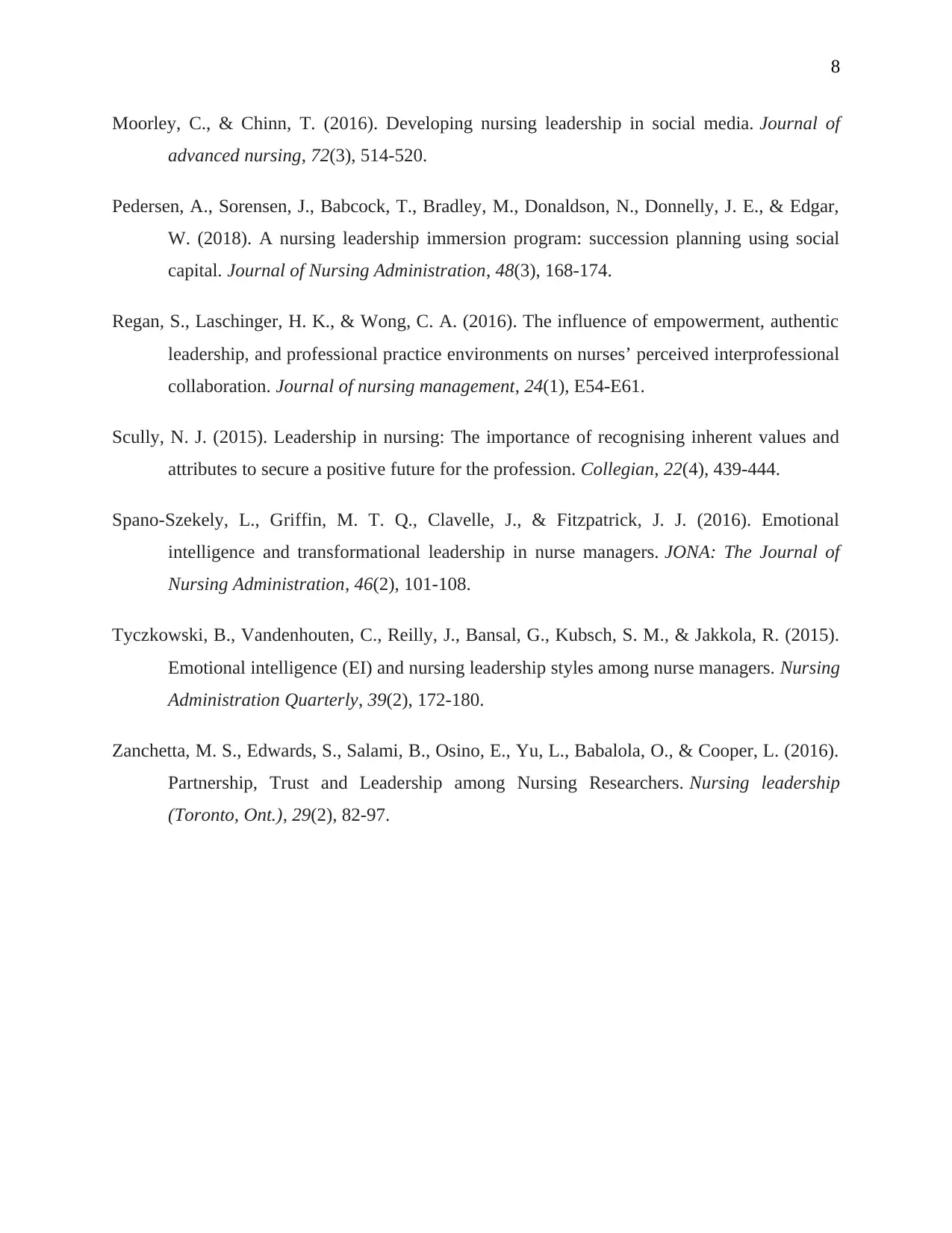
8
Moorley, C., & Chinn, T. (2016). Developing nursing leadership in social media. Journal of
advanced nursing, 72(3), 514-520.
Pedersen, A., Sorensen, J., Babcock, T., Bradley, M., Donaldson, N., Donnelly, J. E., & Edgar,
W. (2018). A nursing leadership immersion program: succession planning using social
capital. Journal of Nursing Administration, 48(3), 168-174.
Regan, S., Laschinger, H. K., & Wong, C. A. (2016). The influence of empowerment, authentic
leadership, and professional practice environments on nurses’ perceived interprofessional
collaboration. Journal of nursing management, 24(1), E54-E61.
Scully, N. J. (2015). Leadership in nursing: The importance of recognising inherent values and
attributes to secure a positive future for the profession. Collegian, 22(4), 439-444.
Spano-Szekely, L., Griffin, M. T. Q., Clavelle, J., & Fitzpatrick, J. J. (2016). Emotional
intelligence and transformational leadership in nurse managers. JONA: The Journal of
Nursing Administration, 46(2), 101-108.
Tyczkowski, B., Vandenhouten, C., Reilly, J., Bansal, G., Kubsch, S. M., & Jakkola, R. (2015).
Emotional intelligence (EI) and nursing leadership styles among nurse managers. Nursing
Administration Quarterly, 39(2), 172-180.
Zanchetta, M. S., Edwards, S., Salami, B., Osino, E., Yu, L., Babalola, O., & Cooper, L. (2016).
Partnership, Trust and Leadership among Nursing Researchers. Nursing leadership
(Toronto, Ont.), 29(2), 82-97.
Moorley, C., & Chinn, T. (2016). Developing nursing leadership in social media. Journal of
advanced nursing, 72(3), 514-520.
Pedersen, A., Sorensen, J., Babcock, T., Bradley, M., Donaldson, N., Donnelly, J. E., & Edgar,
W. (2018). A nursing leadership immersion program: succession planning using social
capital. Journal of Nursing Administration, 48(3), 168-174.
Regan, S., Laschinger, H. K., & Wong, C. A. (2016). The influence of empowerment, authentic
leadership, and professional practice environments on nurses’ perceived interprofessional
collaboration. Journal of nursing management, 24(1), E54-E61.
Scully, N. J. (2015). Leadership in nursing: The importance of recognising inherent values and
attributes to secure a positive future for the profession. Collegian, 22(4), 439-444.
Spano-Szekely, L., Griffin, M. T. Q., Clavelle, J., & Fitzpatrick, J. J. (2016). Emotional
intelligence and transformational leadership in nurse managers. JONA: The Journal of
Nursing Administration, 46(2), 101-108.
Tyczkowski, B., Vandenhouten, C., Reilly, J., Bansal, G., Kubsch, S. M., & Jakkola, R. (2015).
Emotional intelligence (EI) and nursing leadership styles among nurse managers. Nursing
Administration Quarterly, 39(2), 172-180.
Zanchetta, M. S., Edwards, S., Salami, B., Osino, E., Yu, L., Babalola, O., & Cooper, L. (2016).
Partnership, Trust and Leadership among Nursing Researchers. Nursing leadership
(Toronto, Ont.), 29(2), 82-97.
⊘ This is a preview!⊘
Do you want full access?
Subscribe today to unlock all pages.

Trusted by 1+ million students worldwide
1 out of 9
Related Documents
Your All-in-One AI-Powered Toolkit for Academic Success.
+13062052269
info@desklib.com
Available 24*7 on WhatsApp / Email
![[object Object]](/_next/static/media/star-bottom.7253800d.svg)
Unlock your academic potential
Copyright © 2020–2026 A2Z Services. All Rights Reserved. Developed and managed by ZUCOL.





